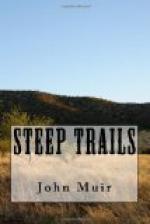Indians are seldom to be met with away from the Sound, excepting about the few outlying hop ranches, to which they resort in great numbers during the picking season. Nor in your walks in the woods will you be likely to see many of the wild animals, however far you may go, with the exception of the Douglas squirrel and the mountain goat. The squirrel is everywhere, and the goat you can hardly fail to find if you climb any of the high mountains. The deer, once very abundant, may still be found on the islands and along the shores of the Sound, but the large gray wolves render their existence next to impossible at any considerable distance back in the woods of the mainland, as they can easily run them down unless they are near enough to the coast to make their escape by plunging into the water and swimming to the islands off shore. The elk and perhaps also the moose still exist in the most remote and inaccessible solitudes of the forest, but their numbers have been greatly reduced of late, and even the most experienced hunters have difficulty in finding them. Of bears there are two species, the black and the large brown, the former by far the more common of the two. On the shaggy bottom-lands where berries are plentiful, and along the rivers while salmon are going up to spawn, the black bear may be found, fat and at home. Many are killed every year, both for their flesh and skins. The large brown species likes higher and opener ground. He is a dangerous animal, a near relative of the famous grizzly, and wise hunters are very fond of letting him alone.
The towns of Puget Sound are of a very lively, progressive, and aspiring kind, fortunately with abundance of substance about them to warrant their ambition and make them grow. Like young sapling sequoias, they are sending out their roots far and near for nourishment, counting confidently on longevity and grandeur of stature. Seattle and Tacoma are at present far in the lead of all others in the race for supremacy,




